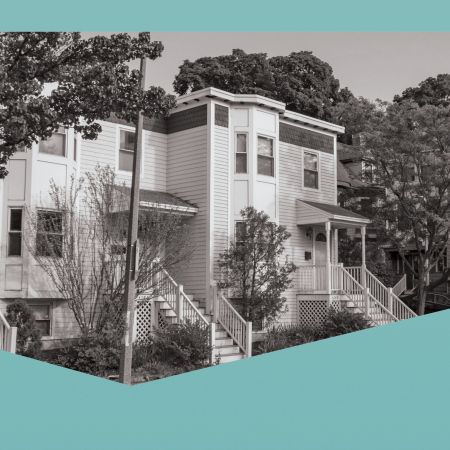Behind the Numbers: Perspectives on Homeownership in Massachusetts

By Alyssa Haywoode
October 26, 2023
Statistics provide an overview of how one’s race and income can make it tough to buy a home in the Boston area, in turn making it tough to build wealth.
But it’s people’s stories that electrify the numbers.
Our October 2023 report, A Long Road Home: A Racial Equity Analysis of Homeownership Support Programs in Massachusetts, explores the racial homeownership gap and includes some of what potential homebuyers and others had to say about their goals and challenges.
Historically, as the report explains, White households have benefitted the most from housing policy in the United States, which has led to higher homeownership rates among White residents. However, a crop of programs designed to serve lower- and moderate-income homebuyers now exists in Massachusetts, and these programs are helping more Black and Latino homebuyers.
To hear directly from these buyers and potential buyers, we conducted interviews and focus groups so that we could hear first-hand about the barriers to accessing affordable homeownership programs; people’s experiences once they enrolled in the programs; and how programs work together to identify and address homeownership gaps. We also interviewed housing program administrators, realtors and real estate agents, mortgage lenders, and housing advocates.
A couple of overarching themes came up in these conversations that were mentioned in the report but merit a closer look. The first of these focuses on the financial challenges of homeownership, including how other life expenses, credit scores and home prices make homebuying difficult. The second focuses on the relationships that homebuyers have with realtors, programs and so on, and involves how communication, trust, and overcoming fears shape homebuying.
Financial Challenges
One recurring theme that homebuyers shared is the challenge of covering life’s costs—childcare, rent, utilities, student loans and other debt—when you have a low income. People who struggle to cover these basic living costs don’t have enough or any money to cover the expenses of buying a home. For instance, here’s what we heard about how student loan debt hinders homeownership:
- I have a huge amount of student loans. I’m an attorney, so I have like $300K… and… just credit card debt from financing my education and my exams.”
- “I understand that student loans are an outstanding debt. But I just find it kind of surprising how much it can affect your ability to obtain a preapproval at a rate that you need. Because a majority of people who went to school have student loans. It’s just an unavoidable thing.”
- “Because I had been so aggressive about paying off debt, when it came time to put money down, I didn’t have everything that I needed.”
Some potential buyers struggled to establish strong enough credit and save for down payments:
- “I’ve done two classes for first-time homebuyers, but I am priced out or my income is too high for me to qualify for anyone to assist me with a down payment.… I went back to school and I’m paying for my education out of pocket now.… It came down to I just didn’t have the down payment money, and so I let that dream go for a while—until I’m ready to move out of state because when it comes down to it, I cannot afford a down payment in Massachusetts. No matter what city.”
- “It’s just so hard to save when you’re paying $2,400 in rent.… How do you save?”
- “Some programs or lenders say they can help you if you have a credit score above 640, I believe. But what about the ones whose [scores are] under 640? What about those people?”
The cost of buying a home in Boston has also been a barrier. Potential homebuyers said:
- “Boston is out of the question. Unfortunately, this is where we grew up. Like I grew up here my whole life, and we can’t stay here.”
- “I know in Boston the prices are ridiculous… Outside of the Boston area, I would go for one of those, whatever I could afford. As long as it’s decent and big enough for what I need.”
And a housing administrator summed up these concerns:
- “For people who are in the $50, $60, or $70,000 bracket, they either have to keep renting, or they have to go very, very far away. That is not good for those people. And it’s also not good for the city and the Greater Boston area, to have all these people who are doing everything they’re supposed to do and working hard… ending up having to leave.”
Homebuying Relationships and Communication
Mistrust of lenders and government housing programs, and fears about racial discrimination also came up among homebuyers. As the report explains, “For many Black households, homeownership has been a long story of exclusion, false promises, and wealth extraction…. Perhaps the best-known example of this was the Federal Housing Administration (FHA)’s practice of ‘redlining’ certain neighborhoods, making them essentially ineligible for federally backed mortgages.”
On this, several potential homebuyers say:
- “What else I’ve discovered is that the information that’s given to us is not the same information that’s going to be given to you just based on this [points to skin color]. And I don’t care where you go, what city, what town… it’s the same thing. And I can say from me and mine, it’s a generational fear and it’s… known generationally what to expect.”
- “I’m afraid. I’m afraid… to get caught up in something I can’t get out of.… I’m afraid to take that first step and not have all the information I need.”
Massachusetts has a number of housing programs that help. MassDREAMS provides down payment assistance. ONE Mortgage and ONE+ Boston provide affordable mortgage products. And the CommonWealth Builder Program and the state’s Chapter 40B law provide incentives for building affordable housing. But even some housing administrators point to discrimination in lending:
- “[W]e also need to push lenders to be cautious of the families that they’re serving. And they should be willing to change the face of homeownership. And they too need to have internal diversity inclusion trainings in assessing their own biases that might exist in mortgage lending… and do the work that’s going to be required to serve the families that are deserving of affordable mortgages… just like everybody else.”
- “We really need to push [bank] presidents to have diversity in loan officers and underwriters.… There’s a lot of bias and discrimination that happened at these levels, that really impacted a buyer of color’s ability to even get a preapproval; the unseen bias that exists is, to be honest with you, disgusting.”
A Long Road Home offers many recommendations to strengthen the state’s homeownership systems, but the insights shared with us in focus groups suggest that better communication, stronger relationships, and more trust across the homebuying process encourages homeownership and helps homebuyers build wealth, particularly those who have been historically discriminated against.
As Boston Indicators Senior Research Manager Kelly Harrington explains: “The human elements are really important, especially as people are getting their foot in the door to homeownership, and making it seem tangible, because for so many people, the thinking is, Why would I even think about homeownership? It just feels like something that’s not for me.”




